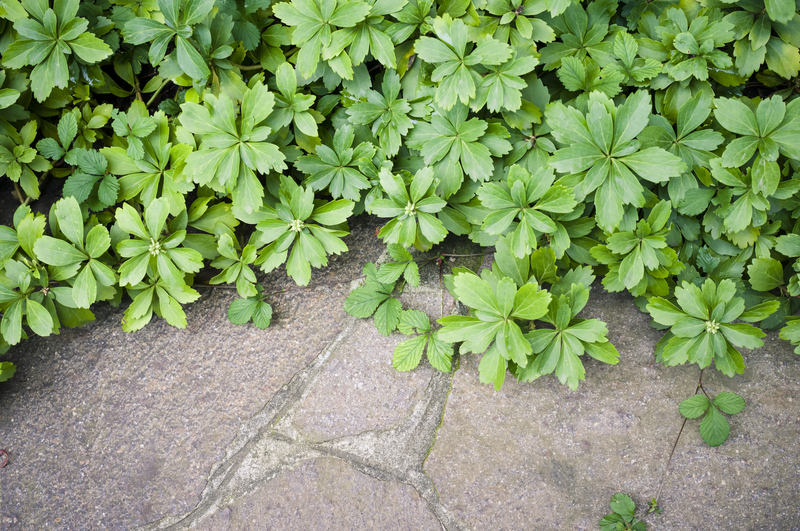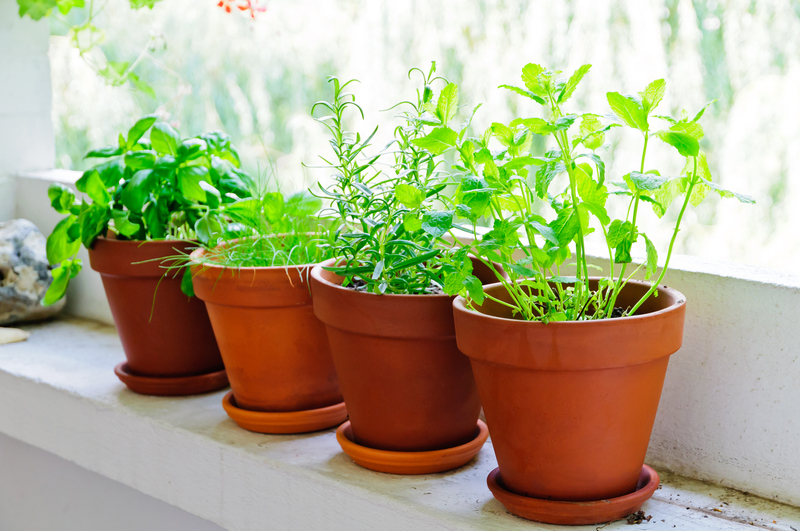Herb Gardening Tips for Every Season
Posted on 20/09/2025
Herb Gardening Tips for Every Season
Herb gardening is one of the most rewarding hobbies for plant lovers and culinary enthusiasts alike. Whether you have a spacious backyard, a small balcony, or just a sunny windowsill, growing your own herbs can provide fresh flavors, fragrant aromas, and even medicinal benefits throughout the year. But how do you care for your herb garden all year round? In this comprehensive guide, you'll discover essential herb gardening tips for every season to help your plants thrive, no matter the weather.
Why Grow Herbs Throughout the Year?
Herbs are remarkably versatile and resilient. Maintaining healthy herbs every season ensures a constant supply for your kitchen, boosts your well-being, and adds natural beauty to your living space. Plus, seasonal care maximizes harvest, fights pests, and enriches soil for future plantings.
- Fresh flavors year-round: Grow culinary staples like basil, thyme, oregano, or mint at your fingertips, no matter the season.
- Fragrant home atmosphere: Many herbs naturally purify air and emit pleasing scents indoors and outdoors.
- Natural remedies: Herbs like chamomile, lavender, and sage have medicinal properties and can be useful for home remedies all year.
- Gardening satisfaction: Cultivating herbs through each season fosters connection to nature and a sense of accomplishment.

Herb Gardening Basics: What You Need to Start
Choosing the Right Location
Most herbs prefer at least 6 hours of sunlight daily. An area with partial shade can work, especially for tender herbs like mint or parsley. On balconies or indoors, use south-facing windows or supplement with grow lights.
Soil and Containers
- Well-draining soil: Herbs hate "wet feet." Use a light, loamy mix and amend garden beds with compost.
- Container gardening: If space is limited, pots, raised beds, or even recycled containers can house thriving herb gardens.
- Soil nutrition: Mix in organic matter like compost or well-rotted manure for essential nutrients.
Watering and Feeding
- Consistent watering: Let the top inch of soil dry before watering again to prevent root rot.
- Light feeding: Herbs require less fertilizer than vegetables; overfeeding can reduce flavor, especially in leafy types.
Spring Herb Gardening Tips
1. Starting Seeds Indoors
Spring is a great time to start herbs from seeds indoors before the last frost. Common herbs like parsley, dill, and cilantro germinate quickly.
- Use seed trays with quality seed starting mix for best results.
- Keep soil moist, not soggy, and provide plenty of light.
- Transplant seedlings outside after the danger of frost has passed and when they have at least two sets of true leaves.
2. Cleaning Up After Winter
Late winter and early spring are perfect for herb garden cleanup:
- Remove dead leaves and winter mulch.
- Prune any damaged or woody stems from perennials like rosemary and thyme.
- Loosen compacted soil and top up beds with compost.
3. Early Spring Planting
Some herbs prefer cooler weather and can be sown directly as soon as the soil is workable:
- Parsley
- Chives
- Cilantro
For a continuous harvest, plant seeds in succession every 2-3 weeks.
Summer Herb Gardening Tips
1. Managing Heat and Water
Summer brings rapid growth but also heat stress. Follow these summer herb maintenance tips:
- Water deeply in the early morning to reduce evaporation.
- Mulch around plants to keep roots cool and retain moisture.
- Provide afternoon shade for delicate herbs like cilantro and basil if temperatures soar.
2. Pruning and Harvesting
Regularly harvest herbs to encourage bushy growth and prevent flowering (bolting), which can make leaves bitter.
- Pinch back the top two sets of leaves on bushy herbs like basil.
- Snip flower buds from mint and oregano to keep tasting fresh.
- Use clean scissors to avoid disease spread.
3. Dealing with Pests
Summer is peak activity for insects. Keep your herb garden healthy and pest-free by:
- Inspecting leaves regularly for aphids, spider mites, and whiteflies.
- Spraying affected plants with a gentle solution of water and mild soap.
- Attracting beneficial insects like ladybugs and lacewings.
Fall Herb Gardening Tips
1. Preparing Perennial Herbs for Dormancy
Many herbs are perennials that return every year, such as chives, oregano, thyme, and mint. Late summer or fall is the time to help them prepare for winter:
- Stop fertilizing in late fall to avoid stimulating new, frost-sensitive growth.
- Prune lightly to tidy up plants; avoid heavy pruning right before winter.
- Mulch around bases to insulate roots from freezing.
2. Extending the Season
Enjoy fresh herbs for longer by:
- Transplanting tender herbs like basil into pots for indoor growing.
- Using cold frames or row covers to shelter herbs outdoors as temperatures drop.
- Harvesting and preserving herbs by drying, freezing, or making herb-infused oils and vinegars.
3. Fall Planting Opportunities
Fall isn't just about winding down! Some herbs, such as garlic chives and parsley, can be planted in autumn in many climates for an early spring harvest.
Winter Herb Gardening Tips
1. Growing Herbs Indoors
Don't let the cold stop your herb gardening journey. Many herbs adapt well to indoor cultivation during winter:
- Choose compact varieties that do well in pots, like basil, chives, and oregano.
- Provide bright, direct light via a sunny window or LED grow lights for 10-12 hours daily.
- Rotate pots occasionally to prevent plants from leaning toward the light.
- Avoid drafty windows and drastic temperature changes.
2. Caring for Outdoor Herbs
For herbs overwintering outdoors:
- Increase mulch layer to protect roots from repeated freeze-thaw cycles.
- Avoid watering when the ground is frozen, but water deeply during dry spells when temperatures rise above freezing.
- Group pots together in a sheltered spot to reduce cold exposure.
3. Planning for Spring
Winter is a wonderful season to dream and plan your next herb garden:
- Browse seed catalogs and select new varieties to try.
- Clean and sanitize pots and tools in preparation for early spring planting.
- Set up indoor seed-starting stations so you're ready when the planting season returns.
Year-Round Herb Garden Maintenance Tips
1. Rotate Crops and Pots
Avoid soil-borne diseases and nutrient depletion by changing up where you grow each type of herb from year to year. This is especially important in small gardens and containers.
2. Watch for Pests and Diseases
Healthy herbs are naturally resilient, but regular inspection and prompt action can prevent infestations and fungal problems.
3. Feed Sparingly
Over-fertilizing is a common mistake. Most herbs prefer lean soil, which actually brings out their strongest flavors and scents.
4. Prune Regularly
Light, frequent pruning prevents herbs from blooming prematurely and becoming woody or leggy.
5. Rejuvenate Old Plants
If you notice older perennials looking tired, divide or replace them in the spring for vigorous growth.
Best Herbs for Each Season
Spring Herbs
- Dill
- Cilantro
- Chives
- Mint
Summer Herbs
- Basil
- Oregano
- Rosemary
- Thyme
Fall Herbs
- Sage
- Parsley
- Chervil
Winter Herbs (Indoors)
- Chives
- Oregano
- Thyme
- Basil (dwarf varieties)
Common Challenges in Herb Gardening
1. Overwatering
One of the most frequent issues, leading to root rot. Always check soil moisture before watering and ensure excellent drainage.
2. Too Little Light
If leaves are pale or plants grow leggy, increase light exposure or supplement with grow lights.
3. Flowering (Bolting)
Hot weather or inconsistent watering causes many herbs to bolt. Pinch off flower buds quickly to preserve flavor.
4. Pests and Mildew
Maintain air circulation, remove affected leaves, and use organic sprays as needed.

Expert Tips for a Thriving Herb Garden All Year
- Experiment with succession planting to enjoy a steady harvest throughout the year.
- Combine herbs with similar needs (sun, water) in the same container or garden bed for easier care.
- Read the specific requirements for each herb--some like well-drained, dry soil (like rosemary), others (like basil) prefer richer, slightly moist soil.
- Try companion planting: Herbs like basil and tomatoes, or chamomile and cabbage, benefit each other.
- Don't forget to enjoy your harvest! Use herbs fresh, dried, or in homemade teas, oils, and vinegars.
Conclusion: Cultivate a Four-Season Herb Garden
With the right care, you can enjoy vibrant, healthy herbs every season, enriching your cooking, healing, and home environment. These herb gardening tips for every season will help you anticipate your garden's changing needs and reap the rewards year-round. Whether you're a beginner or a seasoned plant parent, let your herb garden grow with the rhythm of the seasons--your senses (and your dinner table) will thank you!
Happy Herb Gardening!
Latest Posts
Vertical Gardening: A New Green Revolution
Container gardening: A guide to urban green spaces
Herb Gardening Tips for Every Season



